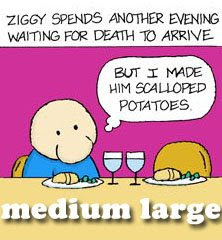With the month less than two days away from retirement, I thought it was time for...
How to Find a Mentor Who Will Guide You Professionally, Advise You Every Step of Your Career and Quietly Hang His or Her Head in Shame When You Blurt Out During a Business Meeting, “Them Donuts Free or What?”
The year was 1200 BC in Ancient Greece. Playwright Eurischylus’ latest theatrical magnum opus, And Then at the Last Minute the Gods Came in and Made Everything All Right Much to the Delight of the Chorus, had wowed the critics (including a young Frank Rich) but closed in two weeks after both failing to attract the coveted male teen audience (which, given the life span of your average Greek citizen back then, was around age eight) and having to compete with Disney’s newest original musical production, a remake of Medea done with ponies. Meanwhile, the great god Zeus still managed to elude paternity suit after paternity suit by picking up women in the form of a swan, a Holstein bull and, according to one plaintiff, a rather aggressive ring-tailed lemur named “Toby.” And, most important of all, the Trojan Wars had begun, amid much media speculation that the rescue of Helen of Troy was merely a political front for the true cause of combat, olive oil.
Prior to setting sail for Troy (which eventually resulted in a harrowing 20-year sea adventure later characterized as “just a hair better than a Carnival cruise”), Odysseus faced a difficult decision. Either he could leave his son Telemachus in the capable hands of his aged, trusted advisor Mentor or Odysseus could leave the child in the care of own no-account Uncle Slackass, who spent his days talking about putting together a prog-rock band and his nights inhaling the fumes at the oracle of the Delphi with his fellow students from air refrigeration technical school, having “visions.” Fortunately, Odysseus chose Mentor, who in turn gave Telemachus knowledge both applied and theoretical so that he may succeed in life. Otherwise, Odysseus might have returned home from the Trojan Wars lo those many years later to find his only son shot-gunning ouzo and idly making notes for a film in which all of the major roles would be played by Star Wars action figures.
In short, choosing a mentor to help guide your career is not enough. You must select the right mentor, all of whom share the same well-defined characteristics:
• The right mentor is like you, only better: My own mentor articulates my concerns and career plans so clearly and at such a higher level of understanding than I do that I'm now afraid to open my mouth ever again, for fear of causing chimps to snicker with derision. He also dresses with far greater flair than I do, associates with a far more enviable circle of associates than I know and, unlike me, would never be caught at a corporate dinner requesting a doggie bag and a “to go” cup of wine. In other words, the more your mentor makes you look at yourself with utter contempt, the better.
• The right mentor is a person of substance: The ideal mentor provides more than just advice. He or she offers the moral and philosophical wisdom necessary for one to make the right decisions. Think of Master Kan in the 1970’s TV series Kung Fu. Remember how Kan would teach young Kwai Chang Caine (an obviously American David Carradine) that “weakness prevails over strength and gentleness conquers” only to then have his protégé press his bare arms against a boiling cauldron of oil for reasons Kan would only explain with a bemused shrug? Remember how Kan would have his eager charge try and try again to snatch a leaf from his 103-year-old arthritic hand, chuckling heartily every time he failed? Remember how Kan would repeatedly “pants” Caine in front of all the assembled Shaolin priests? True, some would remark that Master Kan had clearly gone insane with old age and was now finding delight in tormenting the only supposedly Chinese man to make Marlon Brando’s character in The Teahouse of the August Moon look pure Asian by comparison. But those of us truly in the know realized Kan was doing what any good mentor would do—ensuring his protégé didn’t wind up being a pussy. After all, it’s a tough world out there and Kan wanted to make certain that his young charge had the wherewithal —the cashews, if you will—to handle any obstacle that may come his way.
• The right mentor knows his or her limits: A good mentor will instinctively know their boundaries of involvement in your life. He won’t call you in the middle of the night crying over ex-lovers. He won’t ask you to cover their rent “just this once.” And He won’t interrupt your important questions with “Does this look like a pimple or a canker sore to you?”
Finding the right mentor is crucial, not only for the obvious benefits to your career but also for the collected knowledge you may one day share with others. For in the near future a young up-and-comer may turn to you for guidance and hopefully you will be able to impart something more insightful than “Don’t touch the skim milk in the pantry fridge, understand? That’s mine.”
Subscribe to:
Post Comments (Atom)







3 comments:
Um, it's "elude," not "allude."
Otherwise? Brilliant, as usual.
Uh-oh, you're totally brill-iant.
(And Andy's right about the elude/allude bit).
I'm also a font geek. Oh, the ladies come a-calling, they do.
Post a Comment